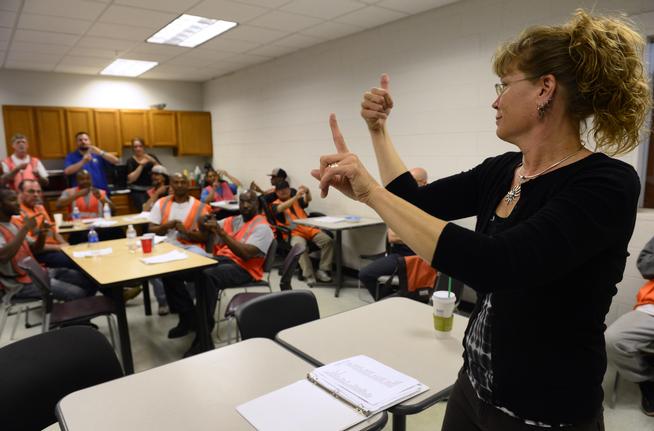Rafael Toquinto Jr. steps out from his spot by the break room soda machine to correct his co-worker — that sign wasn’t quite right.
He and a group of about 20 Goodwill warehouse workers are going over how to say “week” in American Sign Language. They’re in their second month of biweekly classes.
For Toquinto, it’s a sea change.
When he came to Goodwill Industries of Denver in 2006, he was the only deaf worker in the warehouse and struggled to communicate with his boss and co-workers. He had trouble understanding the work he was supposed to do.
Co-workers would gesture and write notes on slips of paper or cardboard boxes.
“It was just very quiet,” Toquinto, 44, said through an interpreter. “There really wasn’t any communication.”
Now, they make attempts at sign language — at least enough to ask for a translation or ask, “How are you?”
“We’re not outsiders anymore,” he said.
Toquinto has done well at Goodwill, but he wasn’t successful right away.
At first, working on the shipping docks, he struggled to figure out what went where until a man who was hard-of-hearing helped him. Over time, he learned how to do metalwork, use a baler and sort recyclables.
Now, he’s certified as a forklift driver — a job that requires precision — with a safety record better than most, said Nicki Cantin, recycling operations assistant. He hasn’t had an accident in years.
Cathy Noble-Hornsby, a sign-language instructor who manages Goodwill’s deaf-services program, said he has also stepped up as a role model to two other deaf men who now work in the warehouse, which sorts through millions of pounds of unsold donations to be recycled. Goodwill’s Denver program includes 17 deaf people.
Toquinto helped Josue Candelaria-Facio, who has worked at Goodwill for four years, learn the ropes, and Candelaria-Facio checks in with him from time to time, asking for help or to make sure he’s doing the job right.
Having someone to talk to, Toquinto said, has been nice.
The sign-language classes were born of safety concerns, Cantin said: If the fire alarm went off, managers wondered, how could they tell Toquinto and Candelaria-Facio they needed to get out?
“We’re supposed to be working as a team, but we couldn’t even talk to each other,” Cantin said.
The effect at work has already stretched past safety.
Warehouse workers such as Judi Lawless stop by to spell out words in English, using the sign-language alphabet they’ve learned. Toquinto answers with a translation. They say good morning. They don’t just walk by.
“I can include them more,” Lawless said of her deaf colleagues.
Now, when a co-worker tries to communicate with written notes or by pointing — at a shoe, for example — Toquinto calls him out. Stop dancing around, he’ll say, and try to use a sign.
“I’ll go, ‘OK, enough writing now,’ ” Toquinto said. “Now come into my world.”
Sitting in the cinder-block break room, with forklifts honking outside, the workers, all wearing orange safety vests, sit quietly trying to follow along as Noble-Hornsby signs the days of the week.
A few have trouble, placing a finger in the wrong spot or facing a hand the wrong way. The quiet turns to laughter when they reach Sunday — both hands facing out, swirling in opposite directions.
The progress is slow, and sometimes awkward, Toquinto and Candelaria-Facio say, but their colleagues are coming along.
“I really feel kind of proud that they’re willing to learn my language,” Candelaria-Facio said. “It’s really nice — even on that basic level — to be able to communicate.”
Thad Moore: 303-954-1902, tsmoore@ denverpost.com or twitter.com/thadmoore

